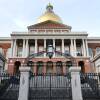Discounted happy hour drinks have been banned in Massachusetts for nearly four decades but they may be making a comeback this year — despite opposition from the bars and restaurants that serve the booze.
As the legislature considers a $4.4 billion dollar economic development bill, the state Senate approved an amendment offered by Sen. Julian Cyr that would give cities and towns permission to allow bars to sell discounted after-work drinks.
A return of happy hour is a popular idea among citizens — according to a 2021 survey by MassINC, 70% of residents were in favor of the practice. Respondents in that survey said the availability of ride-share apps to keep people from drunk driving made happy hour more palatable. Another recent effort to revive happy hours through a ballot question did not get enough signatures to get a place on the ballot this year.
More Local News
“People do have options, like ride-sharing options like Uber and Lyft provide another way for people to get home,” Cyr told GBH News. “Happy hour is something that I hear time and again from constituents and from my friends and from small businesses as an option that people would like to have.”
But industry groups and some restaurateurs are opposed to the reinstatement of happy hour drink discounts. Steve Clark, President and CEO of the Massachusetts Restaurant Association, expressed his concerns regarding the amendment.
“You spend so much money crafting and building your menu prices that to now discount one of your highest items doesn't really make sense for the bottom line of a restaurant,” Clark said. “It doesn't really work.”
Abby Taylor, manager at Grendel's Den Restaurant & Bar in Cambridge told GBH News she has the same concern. “It's not really worth it to us to discount alcohol, it just invites a lot of problems. We already have enough trouble keeping people from drinking too much as it is,” Taylor said. The restaurant instead offers half-priced food during happy hour.
Cyr points out that the amendment will not force businesses or municipalities to allow happy hour again, it only creates an option that both businesses and cities will have.
“This is about giving cities and towns who are looking to revitalize their downtown or get people back to main street as were emerging from this pandemic,” Cyr said
And he notes that happy hour “is just something that people enjoy.”
Clark with the MRA areed. “22-year-old me would be shocked that I’d be taking a position against happy hour,” he said.








